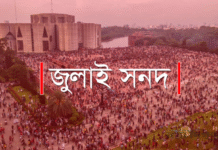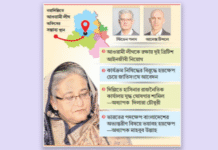Mollah first to walk gallows for war crimes 42 years back, to be buried at Faridpur village home under police protection
 He didn’t wince once, neither did his heart skip a beat when he led his men to thrash a two-year-old child to death and slit the throats of a pregnant woman and two minor girls.
He didn’t wince once, neither did his heart skip a beat when he led his men to thrash a two-year-old child to death and slit the throats of a pregnant woman and two minor girls.
Around 42 years later, Jamaat leader Abdul Quader Mollah finally had to pay for these acts of cold-blooded savagery, as he walked the gallows at 10:01pm in the first-ever execution in a war crimes case.
The hanging of Mollah, 65, who earned the nickname Mirpurer Koshai (butcher of Mirpur) for his sinister role during the Liberation War, represents a watershed in the nation’s pursuit of a closure on the wounds inflicted in 1971.
Mollah’s body would be taken to his ancestral home at Sadarpur upazila in Faridpur for burial under police protection, Abu Hena Morshed Zaman, deputy commissioner of Faridpur, told The Daily Star at 10:15pm.
He was executed at the Dhaka Central Jail hours after the Supreme Court rejected his petition to review the death sentence, bringing an end to the drama that played out for two days since Tuesday evening.
Mollah’s counsels took out an order from the SC chamber judge to stay his execution on Tuesday night, only one and a half hours before the convicted war criminal was to hang at 12:01am.
The SC yesterday rejected Mollah’s plea for reviewing his death sentence, clearing the way for executing the condemned war criminal.
In his instant reaction after the execution, Shafiuddin Mollah, who testified against the Jamaat leader, told The Daily Star, “We are very happy. The grief and agony that have haunted us for the last 42 years will go away to a great extent.”
Shafiuddin, who lost his paternal uncle in a massacre at Alubdi village in Mirpur, said they would feel happier when all 1971 war criminals will get their due punishment.
He thanked the prime minister and all pro-Liberation War forces for their continuous efforts to bring the war criminals to justice.
![]()
Mollah, who was then a leader of Islami Chhatra Sangha, later renamed Islami Chhatra Shibir, never repented of the war crimes he committed 42 years ago. His party also never regretted its role during the Liberation War.
Driven by his deep political conviction that Pakistan should remain united even at the cost of one of the worst genocides in the world, he had targeted freedom-loving Bangalees and led his gang in at least two mass killings in Keraniganj near Dhaka and Mirpur, taking the lives of around 400 unarmed Bangalees.
Mollah, assistant general secretary of Jamaat-e-Islami, was finally shown arrested in a war crimes case on August 2, 2010 after enjoying impunity under the auspices of the Jamaat and the BNP.
He was then put on trial and awarded life term by the International Crimes Tribunal-2 on February 5 this year.
But the “lenient” sentencing gave birth to the never-seen-before Shahbagh movement that demanded maximum punishment for the war criminals.
The movement prompted the government to amend the relevant act to ensure the state’s right to appeal on behalf of the victims of the 1971 war crimes.
As the government appealed against the verdict, the Supreme Court on September 17 sentenced Mollah to death, overruling the ICT-2 judgment.
The countdown to Mollah’s execution started soon after the ICT-2 sent the death warrant to the authorities of Dhaka Central Jail on December 8. But confusion arose over the date of execution as the defence lawyers claimed that their client had the right to seek review of the SC verdict.
On Tuesday, State Minister for Law Qamrul Islam said according to the constitution, Mollah had no right to file any review petition, since he had been convicted and sentenced to death under the International Crimes (Tribunals) Act, 1973.
Things started to change quickly on Tuesday evening when the jail authorities asked Mollah’s family members to meet him at 8:00pm, giving rise to speculations that the Jamaat leader would be hanged that night.
Mollah’s counsels then rushed to the residence of Justice Syed Mahmud Hossain, chamber judge of the SC, who stayed Mollah’s execution.
A five-member SC bench headed by Chief Justice Md Muzammel Hossain, dismissed Mollah’s review petition yesterday on completion of a hearing on the maintainability of the petition.
Unhappy at the ruling, pro-Jamaat lawyers demonstrated at the SC premises, while pro-Awami League lawyers chanted slogans hailing the decision.
Hundreds of people, especially youths, rushed to Gonojagoron Manch at Shahbagh to celebrate the court ruling.
Mollah’s nine family members, including his wife Sanowara Jahan, met him inside the Dhaka Central Jail around 6:25pm yesterday on permission from the jail authorities.
On December 17, 2007, freedom fighter Mozaffar Ahmad Khan of Keraniganj filed a case against nine Jamaat leaders, including Mollah, on the charge of killing two freedom fighters in 1971.
But the justice seekers had to wait until the Awami League-led government formed the ICT on March 25 in 2010 as part of its electoral pledges.
On May 28, last year, the tribunal framed six charges that include: the killing of Mirpur Bangla College student Pallab; the killing of the poet Meherunesa, her mother and two brothers; the killing of journalist Khandker Abu Taleb; a mass killing in Ghatarchar of Keraniganj; the killing of 344 people in Alubdi village in Mirpur; and the killing of Hazrat Ali Laskar, his wife, three daughters and two-year-old son.
The ICT-2 found Mollah guilty on five charges and acquitted him on one charge related to the Ghatarchar killing, and sentenced him to life imprisonment. But the Supreme Court found him guilty on all charges and awarded him death for killing Hazrat Laskar and his family members.
Source: The Daily Star









